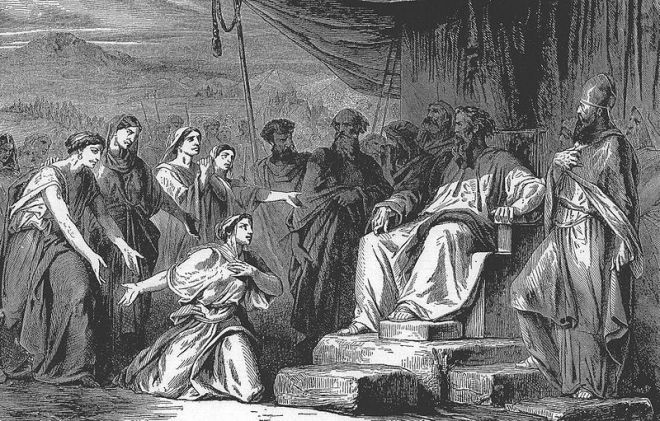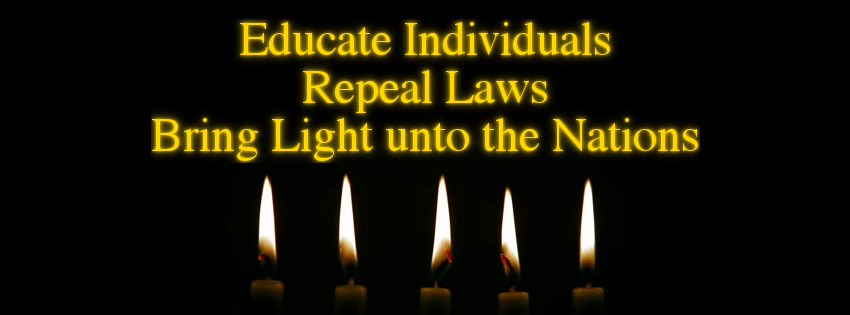I am two Shabbats behind, but I intend to make them up anyway. Two Shabbats ago, the parashah was Pinehas (Bemidbar/Numbers 25:10–30:1). This is the story of the inheritance of the priesthood, the revenge against the Midianites, a second census, the divisions of land, questions of inheritance, the succession of Moshe, and what offerings are to be made every year.

The Daughters of Zelophehad from the Bible and Its Story Taught by One Thousand Picture Lessons (1908)
In this parashah, we learn the importance of succession and inheritance. The parashah uses several examples to show that succession and inheritance were critical to the survival of the Jewish people. This demonstrates how a strong family can be one of the most resilient forces against the centralization of governance.
Pinehas was the son of Ele`azar, the son of Aharon the first High Priest. God told Moshe to appoint Pinehas and his descendants the eternal priesthood, the Kohanim. This was due to his having killed off a crazed troublemaker and restoring righteousness to the Israelites who had been fornicating with women. This eternal investiture is one of many examples of inheritance in the Torah and serves to reinforce the importance of it as a bulwark against outside forces. The priesthood is not to be elected as elections are known to corrupt candidates. With an inherited priesthood, fathers can teach their sons properly and ensure that everything is done right. There is no need to have popularity contests that end up putting those who hand out indulgences into positions of import.
Later on, as Moshe is apportioning land in Israel, the daughters of a man named Selofehad came to Moshe to ask if they would be able to inherit on behalf of their father. Selofehad had no sons, so there was an important question of what to do with his property. Should the government take it to give to the poor or to whatever scheme some elites want? Of course not! Moshe asked God what to do, and He replied that the daughters were right. They are his children as much as sons could be, so they may inherit as well. If a man has no children, his property is to go to his brothers. If he has no brothers, then his nearest relatives after that. This is known as male-preference cognatic primogeniture. Sons are preferred, but daughters may inherit instead.
Bemidbar 27:3-4
אָבִינוּ, מֵת בַּמִּדְבָּר, וְהוּא לֹא-הָיָה בְּתוֹךְ הָעֵדָה הַנּוֹעָדִים עַל-יְהוָה, בַּעֲדַת-קֹרַח: כִּי-בְחֶטְאוֹ מֵת, וּבָנִים לֹא-הָיוּ לוֹ.
לָמָּה יִגָּרַע שֵׁם-אָבִינוּ מִתּוֹךְ מִשְׁפַּחְתּוֹ, כִּי אֵין לוֹ בֵּן; תְּנָה-לָּנוּ אֲחֻזָּה, בְּתוֹךְ אֲחֵי אָבִינוּ.
Our father died in the wilderness. He was not in the midst of the community that came- together against YHVH, in the community of Korah; rather, for his own sin he died, and sons he did not have. Why should the name of our father be taken-away from the midst of his clan, (just) because he has no son? Give us a holding in the midst of our father’s brothers!
The question appears to be more about what to do if the father does not leave a will or divide up his possessions as is usually done. In that case, and even usually in a will, a father would divide up his property among his sons. He certainly could opt to make provisions for his daughters, as Iyov did.
Iyov/Job 42:15
וְלֹא נִמְצָא נָשִׁים יָפוֹת, כִּבְנוֹת אִיּוֹב–בְּכָל-הָאָרֶץ; וַיִּתֵּן לָהֶם אֲבִיהֶם נַחֲלָה, בְּתוֹךְ אֲחֵיהֶם.
And in all the land were no women found so fair as the daughters of Job; and their father gave them inheritance among their brethren.
Finally, God informs Moshe that he will die soon. There appears to be an insinuation that Moshe may have lived much longer than he did (120 years), had he not disobeyed when he struck the rock to give water. Thus, the Children of Israel will need a new shepherd to guide them into Israel and the future. God states that Yehoshu`a, one of the two scouts who told the truth, will be his successor. Yehoshu`a was to stand before Ele`azar, the high priest, and the community to be appointed by Moshe as the successor. Again, we see that the leader is not to be elected. In this case, direct inheritance is not required. The leader must also be a man of good character who is honest and optimistic, as Yehoshu`a was.
Inheritance is an important issue in liberty. Many take a view that every man and woman should build themselves up and have no born advantage. There is still a question of what to do with someones property when they die. These same people argue that it should go to the government to be redistributed to various purposes: an estate (or death) tax. It is commonly mocked that you get taxed even in death. Resisting this is the command of the Torah: we are to give our property to our family, whoever is there to accept it. The government may not take it to redistribute, nor may it take possession as ward. This is commonly done today when someone dies without a will and without clear heirs. The government seizes their property, rather than attempt to find the nearest kin.
The family is repeatedly cited by many thinkers as the greatest force against the centralization of the state and power. Indeed, one almost always feels a strong connection to his family no matter what. Family members will defend their own, even when one of them has done wrong. This is a good thing and can be a powerful force. A great modern example is how the Bundy family in Nevada stood up to a gang of powerful criminals, drew in outside support, and won the day. With inheritance, families can bond well and accumulate resources that make them stronger in the face of a prospective power organization. If each family was strong and wealthy, any outlaws who wanted to form a government would have a difficult time. Thus, we are encouraged to take steps to build and sustain these bonds, and also ensure our descendants live better than we do today.
